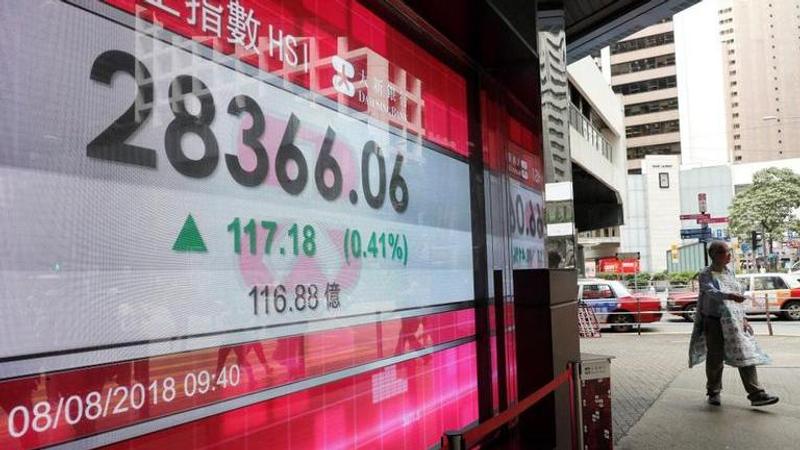Published 12:29 IST, July 24th 2020
Asia shares slip as China orders US consulate closed
Worsening China-U.S. friction, worries over aid to Americans and U.S. businesses and a stumble on Wall Street combined to push shares in Asia lower on Friday.

Worsening China-U.S. friction, worries over aid to Americans and U.S. businesses and a stumble on Wall Street combined to push shares in Asia lower on Friday. Shanghai led regional declines, with its Composite index giving up 3.1% to 3,220.65. The Hang Seng in Hong Kong lost 2.4% to 24,663.68.
Trump administration officials have escalated their public condemnations of China in the last several weeks, with speeches by FBI Director Chris Wray, Attorney General William Barr and Secretary of State Mike Pompeo. As expected, China announced the closure of the U.S. consulate in the western city of Chengdu. The move was in retaliation for the U.S. order earlier this week to close the Chinese consulate in Houston, Texas.
The latest dust up between the two biggest economies comes amid allegations of theft of U.S. intellectual property including by Chinese researchers with military and government connections — for Beijing’s benefit.
“Alongside the eviction of the Houston Chinese Consulate, the risk of the U.S.-China conflict escalating into a “Cold War” is worrying,” said Hayaki Narita of Mizuho Bank.
A speech by U.S. Secretary of State Mike Pompeo’s saying that “securing our freedom from the Chinese Communist Party is the mission of our time” adds to the rhetoric certain to incense Beijing, making it still more difficult for either side to back down, he said.
“And so, while the inevitability of deteriorating US-China relations as a structural feature of our geo-political landscape was never in doubt, the shifts appear to be hastened,” Narita said.
In other Asian trading, the S&P/ASX 200 in Australia gave up 1.2% to 6,021.40. South Korea's Kospi shed 0.5% to 2,202.81. Analysts said investors also are wary over the unclear prognosis for further stimulus for the U.S. economy, just as the end of a previous package of extra support for those made jobless by the pandemic looms.
Republicans in the Senate were set to unveil their proposals for a $1 trillion COVID-19 rescue package Thursday morning, but that got delayed. Finding a compromise with the Democratic-controlled House of Representatives could prove more difficult than it was in March, when Congress produced a $2 trillion rescue package.
A report Thursday that the tally of American workers applying or unemployment benefits rose last week by 109,000 to a little more than 1.4 million broke a stretch of 15 straight weeks of improvements. That shook investor optimism that the recession might be shorter lived than expected.
The rise in unemployment comes as coronavirus counts continue to rise across much of the Sun Belt, leading to more business closures and the total number of confirmed cases has surpassed 4 million in the U.S. The S&P 500′s 1.2% drop, to 3,235.66, was its first loss in five days and its worst in nearly four weeks. Technology stocks had the sharpest declines after a better-than-expected profit report from Microsoft failed to satisfy investors who were expecting even more. Because Microsoft is one of the largest U.S. stocks by market value, its movements have an outsized effect on indexes like the S&P 500.
The Dow Jones Industrial Average lost 1.3% to 26,652.33. The Nasdaq composite fell 2.3%, to 10,461. Smaller stocks held up better, and the Russell 2000 index of small-cap stocks was virtually unchanged, adding 0.06 points to 1,490.20. The yield on the 10-year Treasury was steady at 0.58%, down from 0.59% late Wednesday. It tends to move with investors’ expectations for the economy and inflation.
Gold for delivery in August lost $7.40 to $1,882.60 per ounce. It rose $24.90 overnight to settle at $1,890.00 per ounce. Benchmark U.S. crude advanced, gaining 4 cents to $41.11 in electronic trading on the New York Mercantile Exchange. It gave up 83 cents to $41.07 per barrel on Thursday. Brent crude oil for September delivery added 12 cents to $43.43. It fell 98 cents to $43.31 a barrel overnight. In currency dealings, the dollar bought 106.39 Japanese yen, weakening from 106.86 yen. The euro rose to $1.1600 from $1.1596.
Updated 12:29 IST, July 24th 2020




